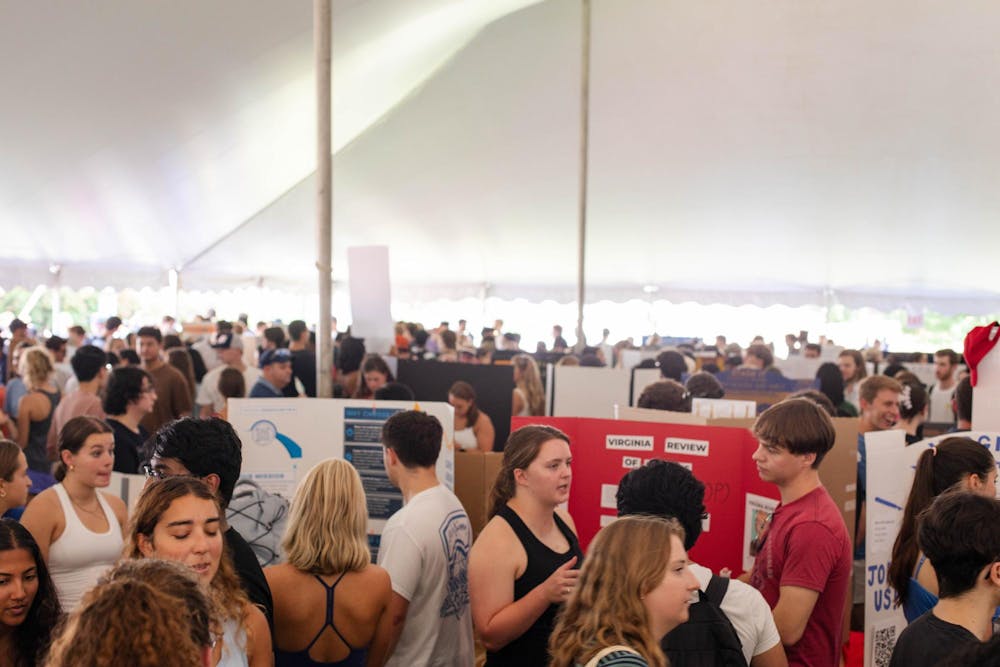As the next semester approaches, many students are engrossed in preparing for spring club recruitment. This speaks to a growing trend of selectivity in Contracted Independent Organizations on Grounds. Across the nation and on Grounds, students are increasingly faced with single digit acceptance rates for student-run clubs at a time when employers seem to care more and more about extracurriculars. Just a generation ago, club competitiveness was not an issue, and clubs were seen as a way for students to participate in and redefine campus culture. We need to reconsider how we think about extracurriculars — this hyper-competitive and exclusive culture which implicitly frames clubs as resume-padders must be stopped.
Aside from just anecdotes, there is little data available for how competitive University clubs can be. So we must turn towards comparable universities to better understand the numbers — take Columbia University and their survey which looked at student satisfaction. A large majority stated that they have either been rejected from or avoided applying to clubs due to their selective nature. The Columbia college student council president, Radhika Mehta, acknowledged how these results pointed to a “lack of community on campus.” And this phenomenon isn’t unique to Columbia. From Yale to the U.Va. Parents’ Forum, more people are detailing their experiences with how rapidly student involvement in many extracurriculars has become increasingly unattainable.
Most clubs at the University do not require an application to join, but out of the nearly 700 diverse CIOs operating on Grounds, approximately 200 clubs do still require multi-step applications including interviews and pitches. Pre-professional clubs are especially prone to being locked behind rounds of applications. Complicated application processes often deny students the opportunity to explore their passions and, in some cases, invest in their future. And it is especially heartbreaking when underclassmen fail to make the cut, in part because they have had less time to develop support systems on Grounds.
Admittedly, restrictive application processes make a great deal of sense in a real-world, professional context, clubs are supposed to be more accessible. In fact, many market themselves as being open to those “without prior experience.” For instance, student government organizations on Grounds such as Student Council, Honor and the University Judiciary Committee heavily imply that they need as many hands on deck as possible every recruiting season. Yet, they introduce prospective students to rounds of applications and interviews.
That in no way qualifies these clubs to suggest they are “open to everyone.” The bottom line remains that to get in one must already be deeply familiar with the industry they represent — an unfair expectation for students who hoped to gain experience through these clubs.
What adds to the frustration is how crucial these clubs are to a student’s time on Grounds. Lots of super selective organizations are complete ecosystems of their own and offer a place to explore the subjects that brought students to the University in the first place. Not to mention the numerous students just looking to pursue a hobby outside their academics who get shut down for not having a year of experience before applying. It is distasteful watching so many organizations advertise at club fair only to shutter down as applications roll in. In an era where loneliness in college is described as a plague, we continue to close off extracurriculars, one of our best options for social engagement.
But let me be clear. This article is, in no way, an argument that all applicants should be accepted into all clubs on Grounds. Certain clubs benefit from limited class sizes. It often makes the club’s core functions significantly easier. Rather, clubs need to reevaluate the transparency of their selection criteria. At the very least, clubs could conduct an annual University-wide survey into recruitment statistics. The existence of this data may shed more light on the situation and allow for more comprehensive action, guiding conversations on when and how to intervene.
One main thing clubs can do of their own volition is to provide an inclusive environment for students who do not make the cut. That could be through application feedback or special consideration during later applications, like prioritizing demonstrated interest. Such inclusivity may reduce the pressure on applicants who fail their first try. And, this could even reduce the competitive nature of the clubs themselves by gradually allowing upperclassmen to join while giving underclassmen the hope of joining in the future. Rejection does not have to be final, and the chance for redemption by learning from past mistakes would exist.
The current club system helps no one and only serves to isolate students. But the future of student organizations does not have to look this bleak. Change may look difficult, but it is worth it. It is time to reclaim our extracurricular spaces as places for our own betterment.
Muhammad Ali Rashid is a viewpoint writer who writes about student self governance for The Cavalier Daily. He can be reached at opinion@cavalierdaily.com.
The opinions expressed in this column are not necessarily those of The Cavalier Daily. Columns represent the views of the authors alone.







